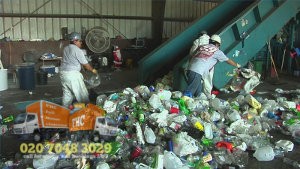Recycling of plastic waste in the UK has been at a decently high level for a period of time now. Having said this, the current macroeconomic climate is affecting the UK’s plastic recycling industry, which in turn has the potential to cause changes in other sectors of the economy. So what’s happening and why?
Until not long ago price of crude oil was high which also kept up the production value of oil derived products and materials, some of the main ones being plastics. High price of plastic material meant that manufacturers were using a decent percentage of recycled plastic in their production lines due to its lower costs. Now that oil prices are at an all-time low, the price of virgin plastic materials is also low, making them just as economically viable for producers as their recycled counterparts. This could pose certain issues for the UK’s recycling industry and its economic output.
 At the moment, a number of key players in the UK’s recycling industry are voicing out concerns and likely to ask for governmental support. Basically, certain segments of the industry are falling as collateral damage to the drop in oil prices. One of the ways to ensure the survival of recycling companies is to raise the purchase price of products which are then used as input for recycling industry. For instance, nearly three quarters of adults in the UK are willing to pay a slightly higher price for a bottle of milk so that recycling that bottle becomes economically viable for recycling companies.
At the moment, a number of key players in the UK’s recycling industry are voicing out concerns and likely to ask for governmental support. Basically, certain segments of the industry are falling as collateral damage to the drop in oil prices. One of the ways to ensure the survival of recycling companies is to raise the purchase price of products which are then used as input for recycling industry. For instance, nearly three quarters of adults in the UK are willing to pay a slightly higher price for a bottle of milk so that recycling that bottle becomes economically viable for recycling companies.
The situation with the UK’s plastic recycling industry is not new, stormy clouds have been on the horizon for one or two years now. Some of the key plastic recycling companies (of foreign ownership) have moved away due to ‘increasingly challenging operating conditions’. A way of saying that business is tough going. During the same period, a number of plastic recycling facilities changed their owners as previous management was struggling. One way to revive the industry (particularly plastic milk bottle recycling) and put things back in order is the voluntary commitment scheme known as the Dairy Road Map. In the UK, recycling of plastic milk bottles is one of the major elements of the plastic recycling industry. The scheme’s purpose was to increase recycled plastic content in milk bottles to thirty percent thus making recycling of plastic material viable again.
Use of new plastic materials as opposed to recycled counterparts is starving the recycling industry from its input resource – plastic waste, particularly polymer. This is a problem on many levels as such operators will not be able to fulfil agreements and commitments. Many of these recycling companies have entered into contracts with international partners making the situation even more complex. If you want to do your little bit in helping the domestic recycling industry by all means recycle – the more the better. If you are a business which has accumulated large amounts of plastic waste secure a specialised rubbish removal service – this will ensure plastic waste is recycled properly and entered back into economy.



